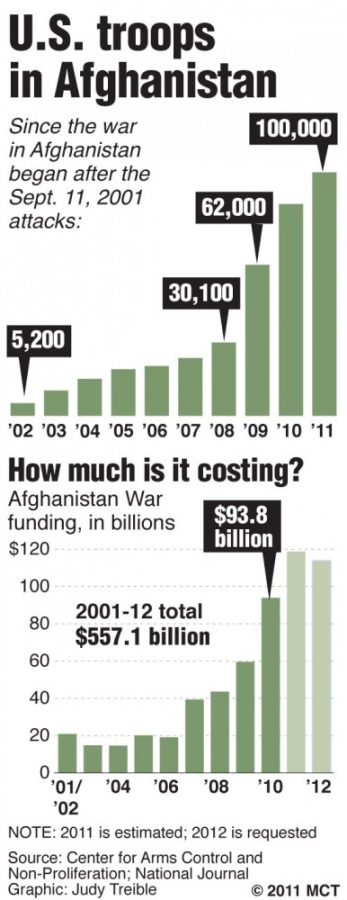WASHINGTON — President Barack Obama plans to pull 33,000 U.S. troops out of Afghanistan well before next year’s election, signaling a rapid drawdown to the country’s longest war sure to please war-weary and debt-strapped Americans.
The quick drawdown will be faster than military commanders had recommended. Instead, it reflects growing public pressure to get out of Afghanistan and to stop spending hundreds of billions of dollars on faraway conflict at a time the U.S. government is grappling with soaring deficits.
Obama plans to withdraw 10,000 troops by the end of this year, with another 23,000 out by September of next year. That would end the surge of 33,000 troops he announced in December 2009, and leave about 68,000 U.S. troops there.
He’ll meet with NATO allies next spring in Chicago to plot the final drawdown of those and other allied troops by 2014, when they hope Afghan forces will be able to guard against any comeback by al-Qaida terrorists or the Taliban regime that had protected them.
His timetable, revealed in calls to congressional and foreign leaders Wednesday and announced in a nationally televised speech from the White House Wednesday evening, was designed to show the way out of the war launched in retaliation for the 2001 terrorist attacks against the U.S.
After weeks of internal debates, Obama settled on a middle-of-the road approach between the military’s recommendations of a slower drawdown and the push for a faster withdrawal coming from members of both major political parties, including Vice President Joe Biden and Sen. Richard Lugar, R-Ind., a top member of the Senate Foreign Relations Committee.
Lugar plans to tell Secretary of State Hillary Clinton at a Thursday congressional hearing that the entire mission in Afghanistan should be redefined away from the broad counterinsurgency strategy that requires large troop levels to a narrower counterterrorism plan.
“”No rational review would commit nearly 100,000 troops and $100 billion a year to Afghanistan,”” Lugar plans to tell Clinton, according to an advance text of his remarks.
“”The country does not hold that level of strategic value for us, especially at a time when our nation is confronting a debt crisis and our armed forces are being strained by repeated combat deployments.””









